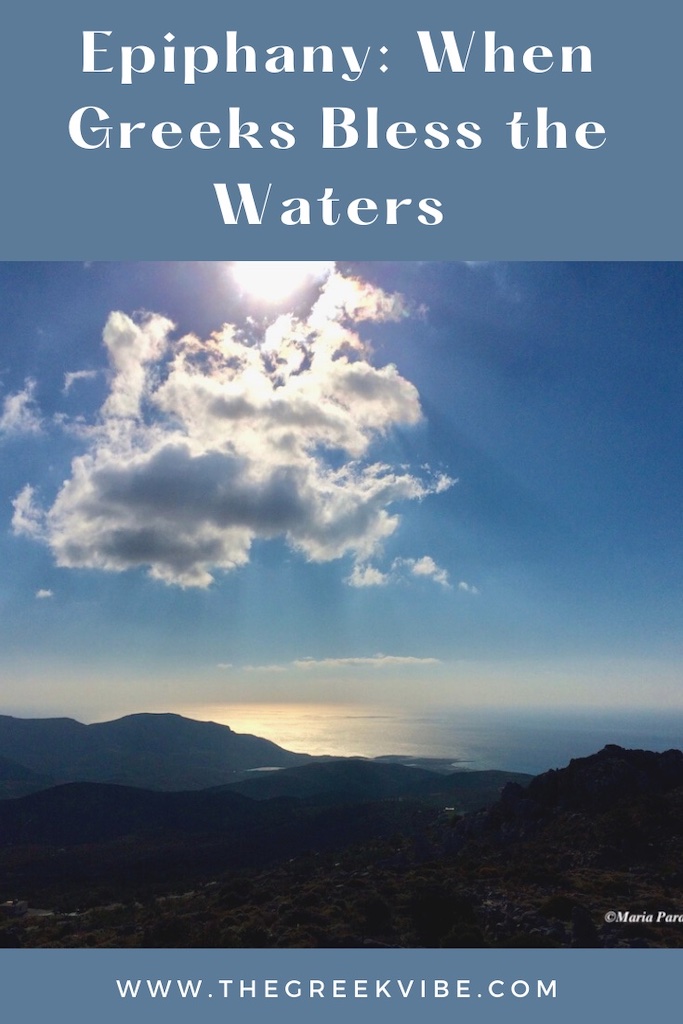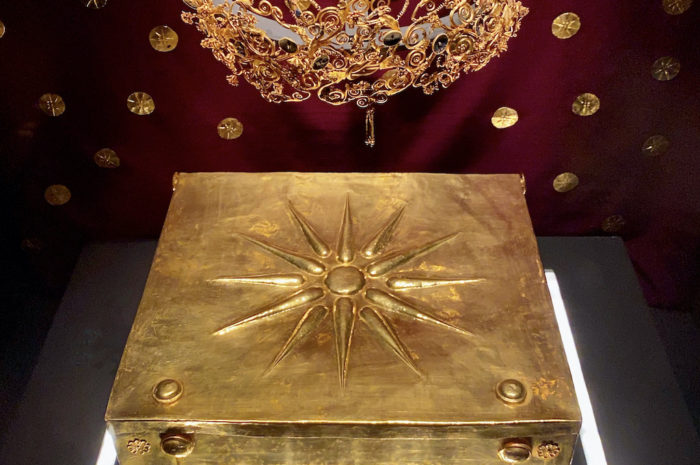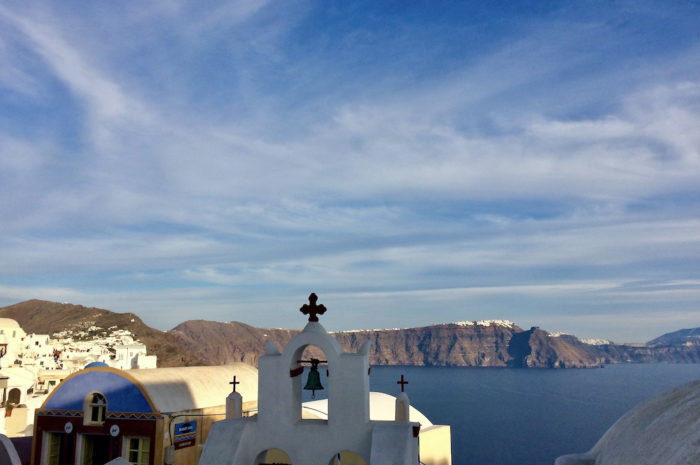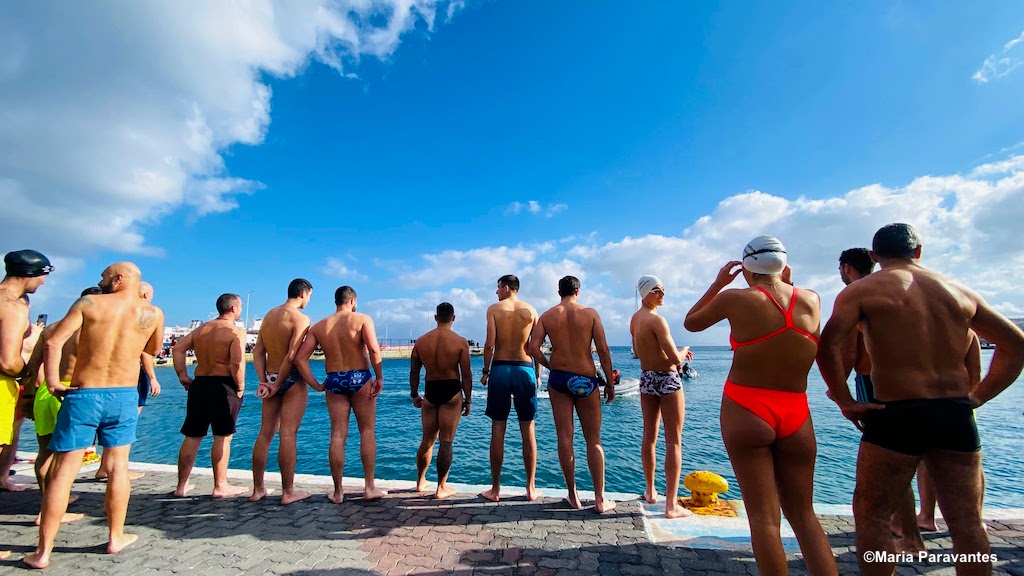
Every year on January 6, Epiphany Day, daring swimmers young and old take their spot on piers across Greece waiting to dive into the cold waters in search of a holy cross thrown in by the local priest. The one who finds the treasured cross first emerges from the waters proud, knowing that he or she will have the “eunoia” – grace of God – for the year ahead. It is customary to honor this day with the release of three white doves which symbolize the presence of the Holy Trinity (Agia Triada).
This is Epiphany Day, when Greece celebrates the Blessing of the Waters, also known as “Theophania“, which means “God emerging in the light“, or “Fota” which means “light”.
The Feast of Epiphany is the third and last holiday of the 12 days of Christmas and officially brings the holiday season to a close, sending a message of spiritual rejuvenation and inner cleansing. It also sends the kallikantzari – Greece’s reckless and naughty Christmas trolls – back to the dark depths of the earth, where they get back to work chopping away at the tree of life until next December. Read more about the kallikantzari and their antics here.
Though today we imagine the Three Magi arriving in Bethlehem with their gifts on December 25th, Christmas Day following the star, historians place their visit 12 days after Christmas on January 6th or Epiphany Day, also known as Three Kings Day. Melchior, Gaspar and Balthazar the kings of Persia, India, and Ethiopia visited the Nativity scene after the birth of Jesus, bearing gifts of gold, frankincense, and myrrh. In the Eastern Christian tradition Epiphany or Theophany marks the baptism of Jesus.
► How Greeks Burn Livani or Incense and Why
Why Do Greeks Celebrate Epiphany Day
The Feast of Epiphany marks the baptism of Christ in the Jordan River by John the Baptist. When Christ arose from the waters, he looked to the sky where the Holy Spirit appeared in the form of a dove and God spoke from heaven. That is why we release doves in the sky on January 6.
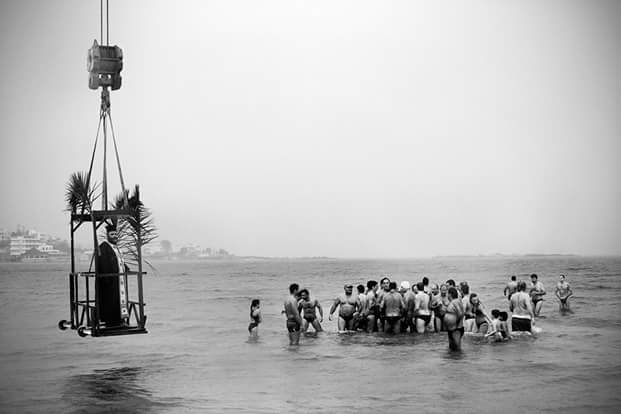
Theophania ceremonies take place at ports across Greece, but also elsewhere in the world where the Greek Orthodox reside. I remember as a young child watching the Blessing of the Waters in Tarpon Springs, Florida. I was in awe. It was like being transported back to Greece and to Kalymnos. Many Greek fishermen from Kalymnos, Symi and Halki emigrated to Tarpon Springs and continued their trade there as sponge divers. Read more about the Kalymnos sponge diver’s dance here.
On this day people named Fotis, Fotini, Fotios, Fani, Theofanis, Theofania, Theoharis, Ourania, Peristera and Iordanis all celebrate their name day. To them we wish Chronia Polla!
Feast of Fota: The Greek Traditions
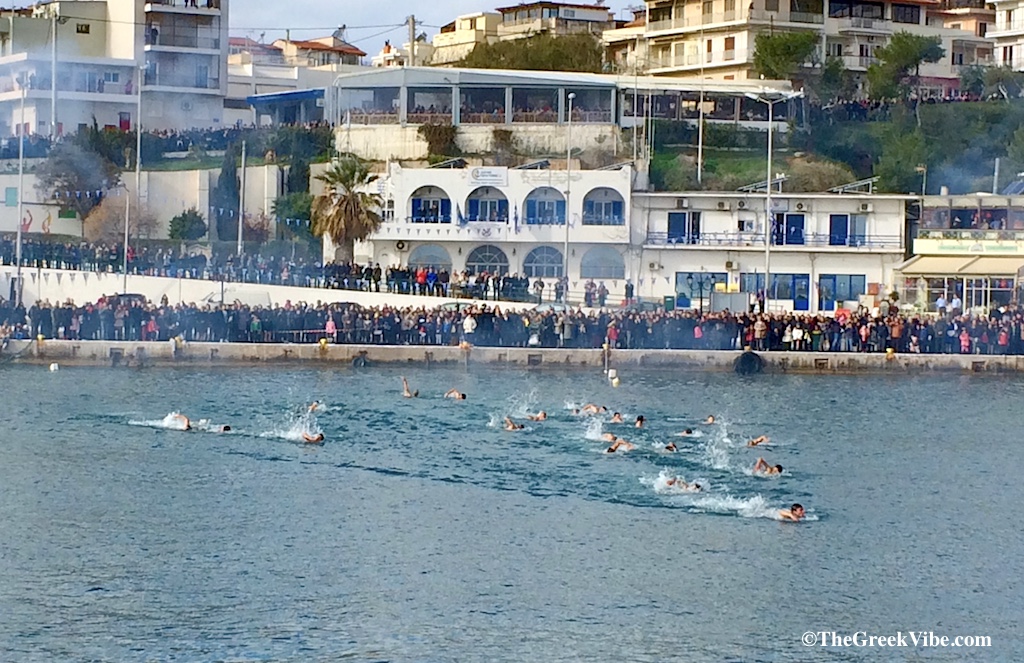
Traditionally, the Feast of Fota begins on the day before (eve) just like Christmas and New Year’s. Children here too sing special carols, the “Kalanta ton Foton”, which like the Christmas and New Year’s carols differ depending on region. Read more about the kalanta of Christmas here and the Greek New Year’s carols here.
Before the caroling, Greek faithful go to church. After the service, the priest, mainly in small villages would visit (and in some parts of Greece still does) and bless each house with a twig of basil dipped in holy water. It is exactly at this time that the Christmas goblins (kallikantzari) flee in fear.
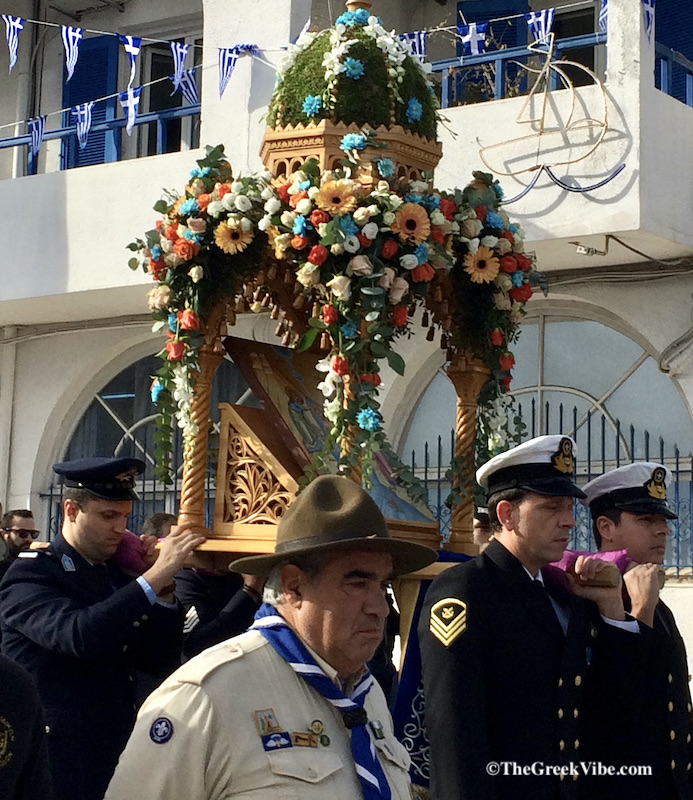
As closure to the 12-day holiday period, Greek housewives used to collect the ash from the fireplace (that burned non-stop for 12 days to keep away the trolls) and scatter it around the home, in the yard, the farm, the fields and in the stables to keep all evil at bay.
According to custom, on the eve of Epiphany day Lenten food is served.
There are many treasured traditions practiced across Greece on the eve of Theophania. On Crete, it is customary to prepare a tray of “fotokolyva”, an offering traditionally for the deceased made of seeds, beans and nuts. The treat is instead shared with the animals and also dispersed as a symbol of prosperity.
►Vassilopita: A Greek New Year’s Cake Bearing Gifts
In the past Greeks would also “wash the icons” on the eve of Fota. Like many Greek practices, the Fota traditions too date back to ancient times. Across Greece, happenings like the “rougatsia” of Thessaly, the “arapides” of Kavala, the “tzamalaria” of Pella, the “babougera” of Drama, the “momogeri” of the Pontic Greeks, the “decorated camel” of Halkidiki, or the “ragoutsaria” of Kastoria are all human attempts to scare away evil, pleas to the divine for protection against darkness, and revelry to welcome the transition from winter to spring and rebirth. These are also the central themes of traditional Apokria festivities held ahead of Orthodox Easter. For more on where to experience the Greek carnival Apokria season read here.
Lastly, the Feast of Fota is very much like a Greek Groundhog Day. It is believed that the winds too are ‘baptized’ on January 6. Legend has it that the weather on Epiphany Day ‘reveals’ the weather to come – of particular importance for the crops. “If the Fota are in bright in light, then waters welcome Easter” or “Joyous arid Fota and wet Easter, means food on the table for the widows, the orphans and the badly wed”.
💡Tip: A great place to celebrate Epiphany Day is in Loutraki. Rent a car 🚙 and in under an hour from Athens you’ll be there. Book a night at this favourite hotel on the seafront.
Theofania: Why it Concerns Us All
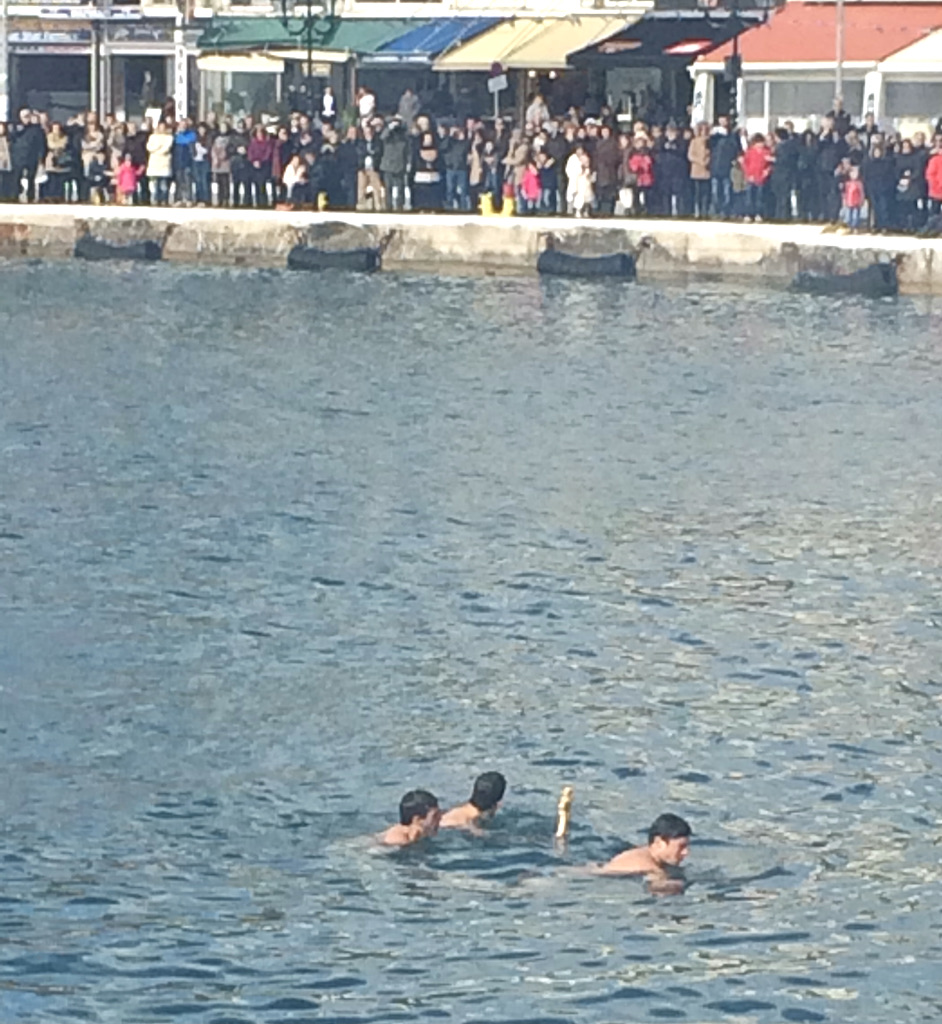
The ceremonial throwing of the cross into the sea as dozens dive into the icy waters to retrieve it is a symbolic “baptism” which gives us the chance to wash away all darkness, seek forgiveness for past failings, and emerge in the light renewed and spiritually rejuvenated.
It is an “inner cleansing” where we let go of things that burden us and look forward to a new beginning. This symbolic purge is necessary as it gives us a chance to make changes for a better life. It also brings us closer to the divine in ourselves.
It is believed that the traditions of Epiphany date back to ancient times. Back then in order to make sure the Goddess Athena would watch over her city Athens; Athenians would clean Athena’s temple on the Acropolis and carry her statue in procession to the sea in Palio Faliro, where they would wash it and as part of the ancient “plyntiria” feast. The idea was to give her powers a new lease on life.
👉🏼 Dream of visiting Greece? Start planning
♫ I end today’s bright post with a traditional Epiphany carol from the Peloponnese “Irthane ta Fota kai ta Fotera” (The Fota Have Arrived) sung by school children directed by the great Domna Samiou. Read more about Samiou’s treasured work here.
Chronia Polla! May there be light in the hearts of all.
Enjoyed this Post? Share and Pin it!
